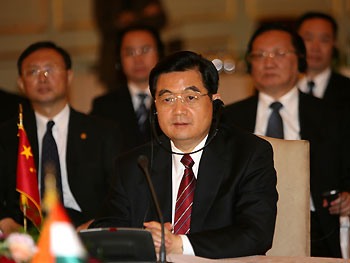
Chinese President Hu Jintao attends a group meeting with leaders
of Brazil, India, Mexico and South Africa in Berlin yesterday. -
Xinhua
Chinese President Hu Jintao on Thursday called for upholding the principle of
"common but differentiated responsibilities" for developing countries in
tackling climate change.
"We should work together to make sure the international community upholds the
goals and framework established in the United Nations Framework Convention on
Climate Change and its Kyoto Protocol and the principle of common but
differentiated responsibilities," Hu said while addressing a meeting of the
leaders of five developing countries -- China, Brazil, India, Mexico and South
Africa.
The leaders met on the sidelines of the outreach session of the Group of
Eight (G8) summit slated for Friday in Heiligendamm in northern Germany.
Developing countries should also carry out "active, practical and effective
cooperation," Hu said.
"Considering both historical responsibility and current capability, developed
countries should take the lead in reducing carbon emission and help developing
countries ease and adapt to climate change," he said.
"For developing countries, achieving economic growth and improving the lives
of our people are top priorities," he said. "At the same time, we also need to
make every effort to pursue sustainable development in accordance with our
national conditions."
Climate change, which could cause swelling sea levels and climate swings, has
become a major issue at the G8 summit, which runs from Wednesday to Friday.
Kyoto Protocol, a document signed in Japan in 1997 that requires
industrialized countries to cut greenhouse gas emission by 5 percent from 1990
levels, will expire in 2012. Parties concerned hope to launch negotiations for
its replacement at an early date.
Skepticism, however, was evident at the summit for reaching a fixed,
quantifiable targets for reducing the greenhouse gas emission.
Before the summit, China, as a developing country, released a master plan
outlining steps it would take to boost overall energy efficiency in 2010 by 20
percent over the 2005 level.
Yvo de Boer, executive secretary of the UN Framework Convention on Climate
Change, said in an interview on Tuesday that the Chinese plan is "very
encouraging."
"It really is an indication that the Chinese government sees acting on
climate change as being part of a larger development agenda," he said.
The Chinese president said at the meeting China gives high priority to
"environmental protection and sustainable development."
"We follow the scientific thinking of development which is people-oriented
and calls for all-round, coordinated and sustainable development," he said.
In addition to taking these steps at home, China is ready to carry out
extensive cooperation with the international community, including other
developing countries, Hu said.
"China is ready to enhance exchanges with other countries and draw upon their
strength in the framework of South-South cooperation and do what it can to help
other developing countries," he said.



